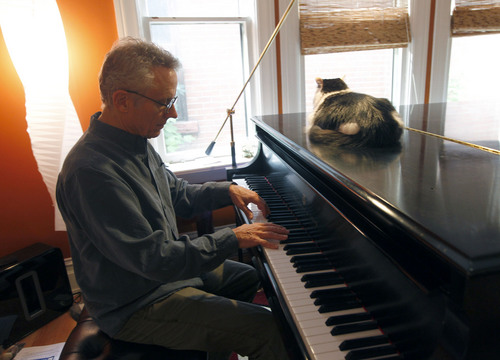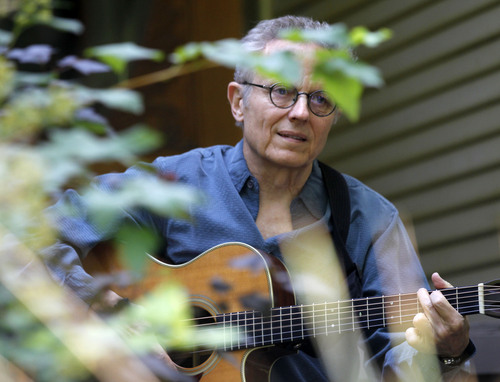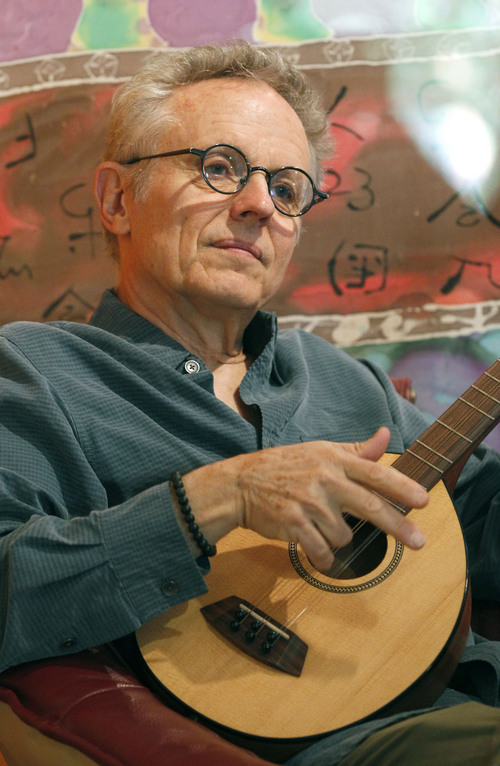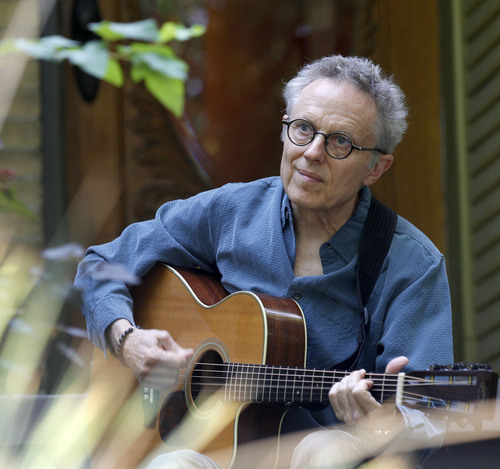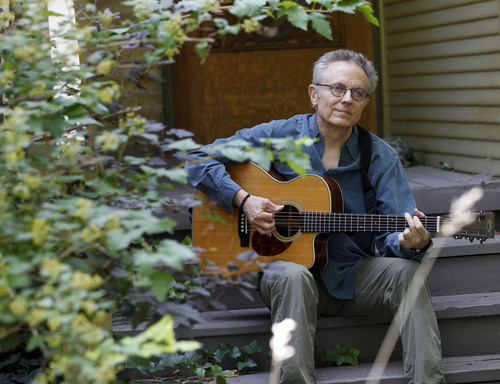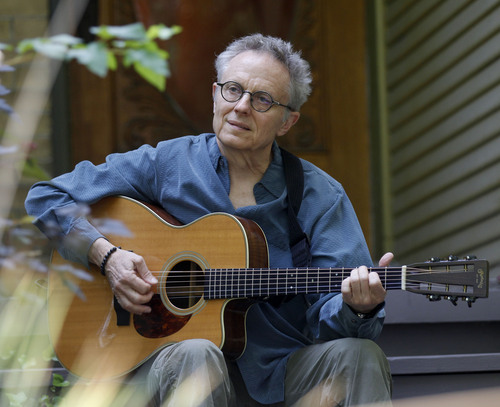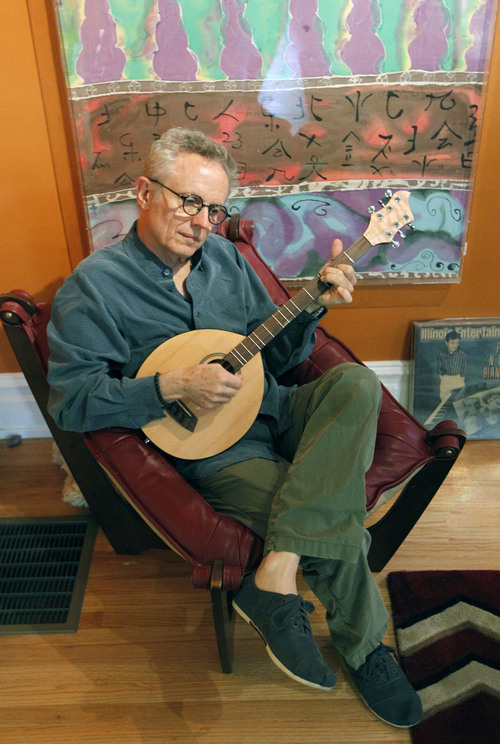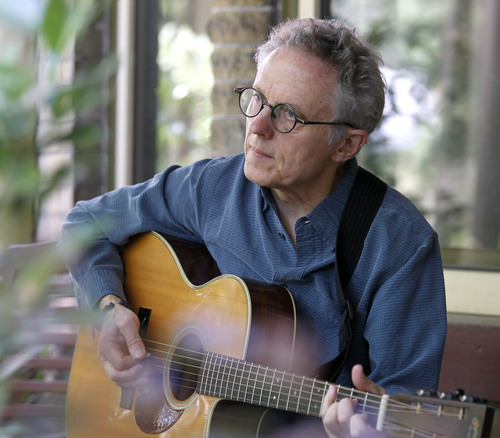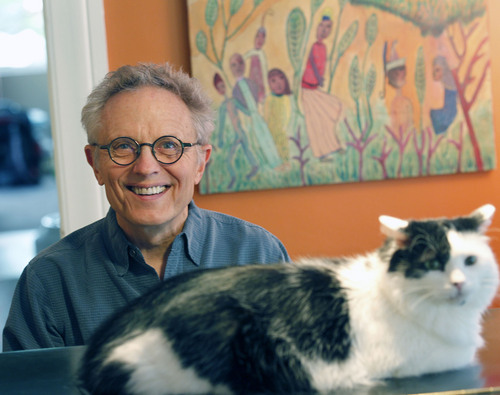This is an archived article that was published on sltrib.com in 2013, and information in the article may be outdated. It is provided only for personal research purposes and may not be reprinted.
The perpetual Phillip Bimstein quandary — although he'd probably call it an opportunity — might be that he has more musical ideas and possible directions as a composer than he has time.
Bimstein's ongoing dilemma has been a delight over the decades, for listeners and collaborators. He has an Emmy to prove it.
The former two-term mayor of Springdale these days is, not surprising, a man with two bands: Blue Haiku and its close relative Red Rock Rondo, a chamber-folk ensemble best known for its award-winning Zion Canyon Song Cycle.
"Phillip is very interested in including everyone's opinion and their expertise," band member Kate MacLeod said.
One of her favorite Red Rock Rondo collaborations is "Work Sleep Love," which Bimstein wrote in 2010 and can be heard on the album "A Secret Gift."
"He was really able to put himself in someone else's shoes," MacLeod said. "He wrote a song from a woman's perspective that was really believable — and that's not always easily done. … It all feels really true."
Considerate. Empathic. Inclusive. They're all words used to describe the Red Rock Rondo catalyst, who is recognized for igniting good things in others no matter what he does in life.
In a recent interview, Bimstein recalled a career in music and politics with more twists and turns than one of his compositions.
The Salt Lake City resident, who now rents the Springdale house he bought in 1988, is an associate instructor at the University of Utah. He offers students esoteric-sounding courses like Honors Think Tank and Composing a Community, which uses music as a "vehicle for a journey into multiple dimensions of human behavior, with side-trips through rhetoric, political theory, sociology, narrative, ideology and identity."
Bimstein cannot help but see and then employ parallels between the art of making music and the art of communication, an approach he used as mayor and now practices as a teacher. Outside and Parade magazines wrote about how he helped unite a once-divided Springdale with his unique approach to leadership.
"His people skills are as good as they get," said Bruce VanderWerff, who was on the town council under Bimstein and succeeded him as mayor for one term. "There's not an adversarial bone in his body."
VanderWerff described Bimstein as casual and creative, yet professional and someone who always encouraged consensus on the council. "He brought a lot of people together," VanderWerff said.
Nowadays people gather to hear his music.
As a musician and composer, he has come a long way since graduating in 1972 from the Chicago Conservatory of Music. His later pieces have been performed in notable halls around the country like Carnegie, Lincoln Center and Kennedy Center; more recently, the Salt Lake Symphony took on his work. For his music, he's been interviewed on National Public Radio and reviewed in the New York Times.
But today's symphonic and professorial sides of Bimstein belie his earlier incarnations as a long-haired, earring-wearing '80s rocker, back when he had a band named Phil 'n' the Blanks in his native Illinois. You can still find the band's songs like "Autosex" and "ViSectomy" at on its Myspace page. "We were big in Chicago," Bimstein said, recalling a time spent on the cusp of fame.
Over tea he'll tell you about his band's music videos that appeared on MTV or the time he opened in Chicago for The Cure. He's even hung out with Talking Heads frontman David Byrne. Not bad company for a kid who started out in high school playing Chicago-area teen nightclubs with a band called Dharma Bums, the name of a 1958 Jack Kerouac novel.
After making music in Chicago, Bimstein landed at UCLA to study composing and conducting, but there was still no clear career path. It was a hiking trip in Southern Utah in 1988 where he decided to build a new musical career, one that has evolved into merging folk and symphony and, at times, farm animals.
These days Bimstein adds to his career's cool quotient with a knack for collecting sounds, some of which he has masterfully and whimsically melded with an alternative music that he calls "techno classical." It's like hip, highbrow and geeky collided, equaling a truly unique listening experience.
He has recorded audio of cows mooing, cats meowing, roosters crowing, doors opening and closing, conversations with ranchers and writers, and he weaves bits and pieces of those clips into his original compositions. He hopes to entertain and enlighten people on subjects ranging from Alzheimer's disease to Utah's renowned Zion National Park. You can hear examples like "The Door," "Garland Hirschi's Cows" and "Lockdown" on his Myspace page.
He also wrote a piece called "Refuge," which shares the name of a book by Terry Tempest Williams. Bimstein recorded Williams reading aloud from her work, marrying spoken word with his music. It premiered in 1999 to a standing ovation at Cathedral of the Madeleine, a moment Bimstein ranks as one of his career highlights.
"Phillip is one of the most creative and hopeful beings on the planet," Williams said. His music, she added, is filled with empathy and optimism and evidence of his ability to "truly listen" and transcend words.
"For me it was listening to someone's creation," she said about what she called in effect Bimstein's musical "translation" of her book "Refuge" at the cathedral. "It didn't belong to me – it belonged to him."
She described Bimstein as generous, humble, yet someone with a "spine" and an "edge." She added that as a musician and collaborator he is someone who "travels beyond language into the spirit that dwells inside an idea. That is the gift of music."
Williams praised his work as mayor — the two testified in Washington together in the '90s on behalf of Utah wilderness and Zion National Park. Bimstein isn't just about creating art, she added, he's also about the "art of living" and contributing and being part of a community. "I think community is at the heart of Phillip Bimstein."
"Utah," Williams noted, "lucked out when he decided to leave California."
And it's in Utah where Bimstein has settled, if only by location, still undecided on which musical direction he'll head next.
"I just have to decide what to focus on," he said, admitting there are about 12 directions he could go.


